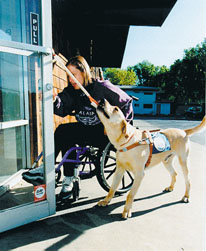Honesty, Understanding: The Keys To ADA
by Toni Giovanetti
A friend of mine injured his leg shortly before going on a trip to Disney World with his family a few weeks ago, and subsequently had to use a wheelchair to get around the park. He said it was a humbling experience because everyone literally looked down on him from their standing positions, and he felt out of control as he was wheeled around from place to place. His family didn't mind much, though, because they were able to go to the front of the line for all of the rides. But he was so unhappy with the way he was stared at and treated by others that he refused to go to the park again during the vacation.
That was one day in his life. Imagine being that person in the wheelchair every day, where most of the places that you are going to are far from being as accessible and accommodating as Disney World. That's what disabled people face when they travel, particularly if they are going to places because of business or need, not personal choice. Despite the Americans with Disabilities Act (ADA) that was expected to free disabled people from worries about accessibility or at least give them more options in terms of access, traveling remains a difficult experience for many people who lack mobility.
Over the years I've heard arguments from both sides about how the ADA is an onerous law that's costing hotels millions, often unnecessarily. I've also spoken to people from disability groups and to the representatives from architectural firms and the ADA. The truth is that the hotels that are most often cited for lacking accessibility are the ones that don't make an effort to comply. Or that don't train their staffs to treat people with the proper decency necessary to help anyone with a special need. Or they aren't honest about what facilities they have when they're on the phone with prospective guests, or they don't hold reservations that they've promised for ADA-compliant rooms.
According to a survey by Microtel Inns and Suites, guests with disabilities say a lack of accurate information about disability-accessible accommodations is the worst problem in hotels, followed by inaccessible showers and bathrooms that are too small. While Microtel already complies with the ADA, it is taking another important step in being one of the few hotel companies to embrace a system-wide training program for employees. Using the Opening Doors® program developed by W.C. Duke Associates of Woodford, VA, Microtel is teaching its workers to be courteous and sensitive to travelers with disabilities, so that they are comfortable. (For information on the program, visit www.wcduke.com).
It seems like common sense, but it apparently is needed among hotel employees, who often do not know how to best serve disabled guests. The Opening Doors® program requires employees to spend time in wheelchairs, to see what it's like. Additionally, they use blindfolds, earplugs, and taped hands to better understand sight impairments, deafness and severe arthritis. That dash of reality will probably bring them a new level of insight into the lives of disabled people, like the insight my friend gained. He says he will never look at people in wheelchairs in quite the same way again.


